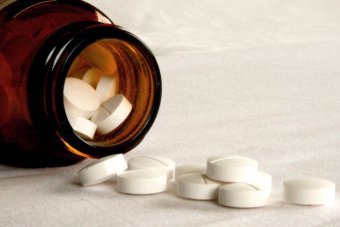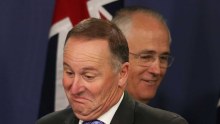Hepatitis C drugs Australia's most expensive, cost taxpayers $1 billion in four months
Posted
Hepatitis C medications approved in March this year have already topped the list of Australia's most expensive drugs, costing the taxpayer $1 billion.
The latest figures have outlined 10 most prescribed and most expensive drugs on the Pharmaceutical Benefits Scheme (PBS) in the past year.
The figures are particularly notable due to the introduction of two new hepatitis C drugs, which were introduced to the PBS in March.
For the more than 230,000 Australians who have hepatitis C, this new generation of drugs was a welcome relief.
Grenville Rose, 62, is now cured from the blood-borne disease.
"The original treatments, the old treatments that everyone's probably familiar with, were horrific," she said.
"I was off work for 72 weeks because of the treatment, I could not work.
"I was sleeping up to 20 hours a day, my gums were bleeding, I had aches and pains throughout my body, on it went.
"Compared with the new one, which was really minimal, and I've been cured of hep C, which was a wonderful, wonderful thing to hear after 40 years of having the virus."
The new drugs called ledipasvir and sofosbuvir have a 90 to 95 per cent success rate of curing hepatitis C, but they are also expensive.
Within just four months of being introduced to the PBS, they have already cost the Government $1 billion for just for 43,000 prescriptions.
Dr John Dowden, the medical editor of the independent journal, Australian Prescriber, which publishes the annual report, said the drug was an investment.
"From a medical practitioner's perspective, you are treating people to get rid of the hepatitis C virus, so that should prevent them from getting liver failure, cirrhosis, liver cancer," Dr Dowden said.
"I would see it as an investment in treating people now to prevent chronic problems and later severe disease leading to death."
People like Ms Rose who have been cured by the drugs say despite the small number of people being treated, the spending is justified.
"You're cured, you don't have it anymore, you don't have to keep taking it," she said.
"Most of the other drugs on the PBS can't cure you, so you'll always be taking those drugs.
"This is a chronic condition we can get rid of.
"Hep C will not be a problem in the future because of this: it's curable."
Top 10 drugs by cost to government
| Medication | Treats | Cost to government | Prescriptions | |
|---|---|---|---|---|
| 1 | Ledipasvir and sofosbuvir | Hepatitis C | $570,730,056 | 25,205 |
| 2 | Sofosbuvir | Hepatitis C | $372,094,623 | 18,738 |
| 3 | Adalimumab | Arthritis and inflammatory bowel diseases | $335,857,859 | 194,405 |
| 4 | Ranibizumab | Macular degeneration | $241,256,012 | 163,595 |
| 5 | Sflibercept | Macular degeneration | $231,194,036 | 155,404 |
| 6 | Esomeprazole | Stomach and oesophagus problems | $170,554,177 | 6,889,031 |
| 7 | Etanercept | Autoimmune diseases | $166,538,773 | 97,291 |
| 8 | Trastuzumab | Breast cancer | $157,134,211 | 50,217 |
| 9 | Fluticasone and salmeterol | Asthma | $148 878,399 | 3,003,985 |
| 10 | Insulin glargine | Diabetes | $146,202,125 | 367,253 |
Prevention ideal but not that simple
The majority of the top 10 most costly drugs to the Government are not widely prescribed.
They include medications like adalimumab for arthritis and inflammatory bowel diseases, which this year cost taxpayers $336 million for 194,000 prescriptions.
Meanwhile, the drug ranibizumab for macular degeneration, cost $241 million for just over 160,000 prescriptions.
The most prescribed drug this year was atorvastatin, with 7.6 million prescriptions filled for the drug used to treat high cholesterol.
Dr Dowden said preventing health issues caused by lifestyle factors would be a lot cheaper than medication, but it is often not that simple.
"We'll always have problems with high blood pressure, heart disease, high cholesterol while we have the lifestyle that we have," he said.
"So living healthier in our day-to-day activities would help reduce the need for the medicines, but they are there if we do need them."
Topics: pharmaceuticals, chemicals-and-pharmaceuticals, australia









